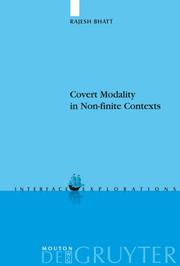| Listing 1 - 1 of 1 |
Sort by
|

ISBN: 1282193872 9786612193873 3110197340 9783110197341 3110179520 9783110179521 9781282193871 Year: 2006 Publisher: Berlin ; New York : Mouton de Gruyter,
Abstract | Keywords | Export | Availability | Bookmark
 Loading...
Loading...Choose an application
- Reference Manager
- EndNote
- RefWorks (Direct export to RefWorks)
This book investigates the distribution and interpretation of Covert Modality. Covert Modality is modality which we interpret but which is not associated with any lexical item in the structure that we are interpreting. This dissertation investigates a class of environments that involves covert modality. Examples of covert modality include wh-infinitival complements, infinitival relative clauses, purpose clauses, the 'have to' construction, and the 'is to' construction (cf. 1): 1a. Tim knows [how to solve the problem]. ("Tim knows how one/he could/should solve the problem.")1b. Jane found [a book to draw cartoons in] for Sara. ("Jane found a book for Sara one could/should draw cartoons in.")1c. [The man to fix the sink] is here. ("The man whose purpose is to fix the sink is here.")1d. Sue went to Torino [to buy a violin]. ("Sue went to Torino so that she could buy a violin.") 1e. Bill has to reach Philadelphia before noon. ("Bill must reach Philadelphia before noon.")1f. Will is to leave tomorrow. ("Will is scheduled/supposed to leave tomorrow.") The interpretation of (1a-f) involves modality; however, there is no lexical item that seems to be the source of the modality. What (1a-f) have in common is that they involve infinitivals. This book addresses the following questions about covert modality: what is the source of this modality, what are its semantic properties, why are some but not all infinitival relatives modal, and why are all infinitival questions modal? The infinitival [+wh] Complementizer is identified as the source of the covert modality. The apparent variability of the force of this modality is related to the particular semantics of this Complementizer. Infinitival relatives that receive a non-modal interpretation are analyzed as being reduced relatives and thus not involving the infinitival [+wh] Complementizer.
Modality (Linguistics) --- Grammar, Comparative and general --- Clauses, Relative --- Relative clauses --- Linguistics --- Relative clauses. --- Clauses --- Philology --- Modality. --- Semantics. --- Syntax. --- Grammar
| Listing 1 - 1 of 1 |
Sort by
|

 Search
Search Feedback
Feedback About UniCat
About UniCat  Help
Help News
News